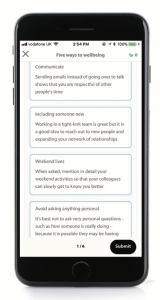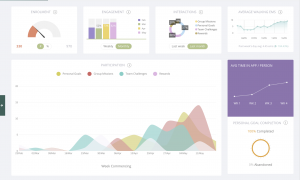What do you get if you combine a stressful job at Goldman Sachs, a deep understanding of tech startups and a passion for wellbeing and behavioural psychology? For Earthmiles co-founder Megha Prakash, this combination led to the germination of an idea that technology could be used to make millions of people’s lives better by improving their wellbeing.
While the consumer Earthmiles app has more than 150,000 users, the workplace version – Earthmiles@Work – is attracting attention from employers and financial institutions alike. It also won Best Health & Wellbeing Innovation at last month’s Corporate Adviser Awards.
So what, one might ask, makes Earthmiles@Work more than just another app? The answer has to be the levels of engagement it is achieving with users. It offers users personal goals designed to build healthier habits, team challenges to build teams, compete and get active, ‘group missions’ to engage a global workforce in a joint social mission, and healthy rewards.
Rewards are paid in Earthmiles, currency that can be spent through the platform’s marketplace. Activity can be tracked through any form of wearable technology, although mobile phones are the most common source of data gathering.
HarperCollins and Ascential PLC have both gone through employer pilots and are moving to formal contracts, with a number of other employers showing interest. These pilots shows 65 per cent of users report they are more consciously active as a result of engaging with the app, while daily activity increases by 33 per cent when employees form teams.
Prakash says: “Back in 2007 I was at Goldman Sachs when new businesses such as Facebook were just emerging. It was a very exciting time. You could see how an idea could change millions of lives, and make a positive impact. I’m not a technical person – it was my personal passion for wellness and behavioural change led me to this. But when the idea came to me, I believed this needed to be there.
“I had seen how you can become a dehumanised version of yourself in the workplace, somebody churning out output. But there is a place today, where employers are competing with well- resourced companies like Google and Facebook which have organisational measures in place to create a good culture, for something that can help employers compete for talent,” says Prakash. “The focusisnowtobea humane employer and not be detrimental but to be incremental to your employees’ wellbeing. Stress is everywhere, and this ‘always on’ lifestyle, which I have been part of, is pervasive – there is a balance to be struck.”
Prakash and co-founder Viren Rajput raised their first round of funding for the consumer app in 2015. “The question that was constantly ask was why is this not in the workplace, but I did not have an industry background in the workplace. I met (Staffcare founder) Phil Hollingdale at an event. He started advising us and he introduced me to Tobin Murphy-Coles, formerly of Aon. I presented the idea to him just as a sounding board but he was really excited about it and became involved.”
 The consumer app has more than 100,000 UK based users, of which more than 30 per cent are engaging on a weekly basis.
The consumer app has more than 100,000 UK based users, of which more than 30 per cent are engaging on a weekly basis.
The app offers rewards based on nutrition, fitness and wellness, offered by national and local vendors across 400 brands. It includes guides to help employees interact socially and emotionally in the workplace. Employees can assess their own wellbeing through the app, and if a problem is identified they can be confidentially referred to a third-party service provider for diagnosis and treatment. This data can then be shared on an aggregated, anonymised basis with management and service providers.
So why would an employer want to implement Earthmiles@Work?
“It is a comprehensive wellbeing platform that embraces social, financial, physical and mental wellbeing. It is designed so that employees will all engage with their own personal wellbeing journey. It uses behavioural psychology, gamification and rewards to engage users.
“It can bring together the different wellbeing elements that employers are offering. Some people are running lunchtime sessions, summer running gym classes. We work with whatever is there within the employer. If there is an EAP or existing counselling services, we enhance use of this. Because employees earn Earthmiles for doing all of these. It creates an integrated platform where they can bring together their entire well-being strategy to be customised in line with their wellbeing priorities, so the content, the challenges, can all be scheduled around their priorities. Employer clients are looking at it as a wellbeing calendar,” says Prakash.
 “We provide an analytics dashboard for HR to be able to see specific problems now but also to paint a picture over time, which is very powerful for employers to be able to structure and manage their own wellbeing programmes. It works with all the wellbeing elements they may have invested in such as EAPs or counselling services, and enhances engagement there by pushing employees towards engagements that may be necessary. This is hugely important because engagement with these features is typically very low, particularly in the preventative stage,” she says.
“We provide an analytics dashboard for HR to be able to see specific problems now but also to paint a picture over time, which is very powerful for employers to be able to structure and manage their own wellbeing programmes. It works with all the wellbeing elements they may have invested in such as EAPs or counselling services, and enhances engagement there by pushing employees towards engagements that may be necessary. This is hugely important because engagement with these features is typically very low, particularly in the preventative stage,” she says.
The app removes the emphasis on outlier athleticism, with rewards given for goals and challenges relevant to users of all fitness levels.
The HR dashboard shows real-time metrics of participation and activity, uptake of healthy rewards, surveys to gauge employee feedback and the monitoring of an overall wellbeing score for the organisation.
For the workplace app there is an element of buy-in that is required from the employer, as this plays a role in take-up. Prakash reports that around 80 per cent of users complete goals, which could relate to nutrition or sleep. But crucially, what proportion of employees actually engage?
“Depending on the engagement from the employer, we see take-up across an employee population of between 40 and 60 per cent, but different people engage with different rates of frequency. But if there is no comms support, take-up can be as low as 20 per cent,” she says.
And how does the app manage data issues?
“This is a huge issue. We are ISO 27001-certified, and that provides a level of comfort to employers. GDPR is increasing protection, but I also think this provides an opportunity to technically advanced, conscious companies such as ours to be able to drive insights like this.
“On our roadmap is the development of a wellbeing score for the organisation overall. The data we get is very powerful and employers can use this to augment the data that they give to health related insurers to challenge the off-the-shelf rates that they may be being offered. This kind of data has the potential to change the way we think about annuities, mortgages or life insurance.
Using some of the data we have to influence these group purchasing decisions is also on our roadmap,” she says, adding that this is where the employee benefits consultant or corporate IFA would take this data to negotiate with insurers on behalf of the employer.
Prakash it at pains to point out the proposition is not just aimed at the gym bunnies.
“Of the 69 million km our members moved last year, 49m of that was walking. So it’s not just the runners, but walkers too – small steps can make a big difference. And 42 million of those steps were done by women, who are normally a group that get less involved,” she says.
Critics might point out that there is a lot of consumption and the products are not cheap. So is there a risk people could end up in a worse position by spending money they can’t really afford to?
“Sometimes we offer just access to a free trial of something, and that helps you explore different lifestyle alternatives until you find something that is suitable to you. It is not consumerism at all – there is no hard sell in the app anywhere. If you choose, you can spend your Earthmiles on the free benefits that come up once in a while and never spend a penny of your own money, and still feel rewarded and excited. But for someone who wants to adopt a healthier lifestyle, everything is there that they would need to do it,” she says.
“Users say any time they spend in the app they feel like they are doing something good for themselves, because even if you are not actually redeeming a reward, you are learning something about healthier living. We are not sending people to Starbucks to buy a creamy, frothy coffee. Everything is there for a reason.”
So is there a vetting process around what gets included? For example, medical professionals question the clinical value of some supplements.
“All the content is tied to what major organisations would approve of, and as far as suppliers, they are vetted in terms of being quality, major organisations.”
Earthmiles takes a cut from suppliers distributing through the app, although the greater majority of its revenue comes from the subscription fee paid by the employer. So could users get the same things elsewhere at lower prices?
“We agree with our vendors, that deals should be the best price in the market. There are many discount websites in the market, but if you are earning these rewards with your sweat and blood, it doesn’t make any sense for you to be able to get the same deal elsewhere,” she says.
And how often do free products come up?
“It depends where you are. Free places in a gym or yoga class are easier for suppliers to give, as they come at no cost to them. But we try not to do too much for free because we don’t want to be seen as a freebies app.”
It’s still early days for Earthmiles@Work, but there is a genuine buzz around the proposition and interest from lots of corners of the workplace benefits community. If the app can solve the industry’s longstanding problem with engagement with the multiple products, services and solutions designed to improve employees’ health and wellbeing, the sky is the limit.
EARTHMILES@WORK INTEGRATING WITH EBCS
Co-founder Tobin Murphy-Coles
“We have NDAs with five global consultancies for the integration of our proposition into what they offer. Employee benefits consultants are realising that they have fantastic capabilities but they are failing to wake up employees to what they offer so that they actually use these services. If you look at health tools, they all struggle to get take-up over 10 per cent. We get take
up of between 40 and 60 per cent. So by increasing engagement they can actually increase the use of the services they are offering.
“We are also in talks with a number of insurers about how we can help them manage risk going forward.
“One global consultancy is looking at us doing something bespoke, although it will be ‘powered by Earthmiles’, as the brand already has weight in the consumer market and it would be pointless to dissipate that.
“We are also under NDAs with two high street banks who are looking at the proposition with a view to using it as a way to stay in touch with their customers throughout the year.”





